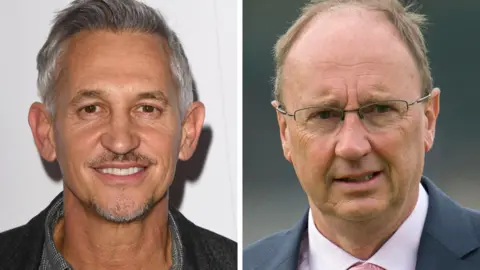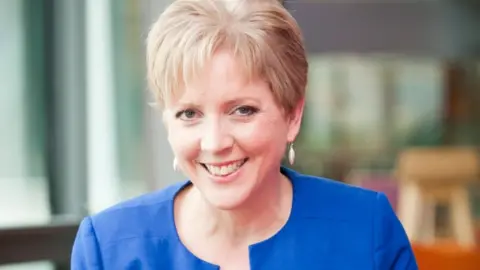Gary Lineker row: What can BBC presenters say and not say?
 Getty Images
Getty ImagesBBC Match of the Day presenter Gary Lineker is not shy when it comes to airing his political views on social media.
But his latest comments - lamenting Brexit and the "state of our politics" - have seen him get a public dressing down by his BBC colleague Jonathan Agnew.
The cricket correspondent tweeted Lineker, saying that he should follow BBC editorial guidelines and keep his political views to himself.
Agnew, like Lineker, supported Remain in the EU referendum.
Allow X content?
In response, Lineker said he was tweeting from a personal account and he would continue to say what he wanted.
Allow X content?
The disagreement came after a string of political tweets from Lineker as the Conservative Party held a confidence vote in the prime minister's leadership.
One included: "Extraordinary to watch us take our country back and rip it to shreds in the process."
He has regularly written critical posts about Brexit and Prime Minister Theresa May, as well as publicly backing the campaign for another EU referendum.
So what are BBC presenters not allowed to say?
As a publicly-funded broadcaster the BBC has its own guidelines, including rules on impartiality, which it says lie "at the heart of public service".
The guidelines state that BBC staff and freelancers who work for BBC News and Current Affairs must not:
- State or reveal publicly how they vote or express support for any political party
- Express a view for or against any policy which is a matter of current party political debate
- Advocate any particular position on a matter of public policy, political or industrial controversy, or any other 'controversial subject'
- Exhort a change in high-profile public policy
So these rules don't apply to Lineker?
In a word, no, because he is a sport presenter.
Following this latest row, a BBC spokesperson said: "Gary is not involved in any news or political output for the BBC and as such, any expression of his personal political views does not affect the BBC's impartiality."
Lineker, who topped the list of the BBC's highest-paid stars, has previously rebuffed criticism of his outspoken political views by saying he is a freelancer and so does not have to abide by the BBC guidelines.
In 2016, when he was criticised for some tweets about child migrants, the BBC responded by saying: "Gary is a freelance broadcaster and this is a personal Twitter account."
But Agnew, also a freelancer, said that this was not the case for him and he represented the BBC even though he also works for other companies.
He said: "If I tweet/broadcast about politics I'll be disciplined. Please believe me. I've been in post nearly 30 years!"
Allow X content?
Unlike Lineker, Agnew - as cricket correspondent - is a reporter as well as a commentator and presenter. The BBC declined to comment on Agnew's remarks.
Are there any other recent cases?
The BBC took some female presenters off air for impartiality reasons earlier this year after they tweeted support for equal pay at the corporation.
It followed Carrie Gracie's resignation as the BBC's China editor, citing pay inequality with male international editors earning more than her.

A day after posting her views about the BBC and equal pay, Radio 4 presenter Winifred Robinson was prevented from hosting a programme focusing on the same issue.
The BBC confirmed it had replaced Robinson due to impartiality issues.
That was the same reason another Radio 4 presenter, Jane Garvey, wasn't allowed to conduct an interview with Ms Gracie after giving her public support to her colleague.
BBC guidelines dictate that reporters should not be "exposed to conflicts of interest", and there must be "editorial separation" of those reporting the story.
Host of the BBC's This Week, Andrew Neil, who is known for his outspoken style, was criticised for calling an Observer journalist Carole Cadwalladr a "mad cat woman" on Twitter.
He deleted the post and retweeted a statement from the BBC press office which said he "recognises it was inappropriate", although he didn't make an apology.
